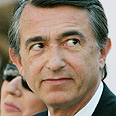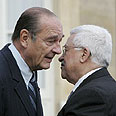

France pledged Saturday to cooperate with a coalition Palestinian government that would include the militant Hamas, in a key boost for Palestinian President Mahmoud Abbas.
But Abbas’ European tour failed to make headway on resuming aid for his struggling people. French Foreign Minister Philippe Douste-Blazy’s promise to work with a government including Hamas and the moderate Fatah party was the bright spot in Abbas’ four-country swing through Europe this week.
Other European leaders were more cautious, preferring to wait until the government is formed before making any commitments. “I encouraged Mr. Abbas to persevere in his efforts to quickly form a national unity government,” Douste-Blazy told reporters Saturday evening as Abbas wrapped up his trip.
If the government is formed according to the power-sharing deal worked out in Mecca last month, Douste-Blazy said, “France will be ready to cooperate with it. And our country will plead on its behalf within the European Union and with other partners in the international community.”
Abbas welcomed the pledge - yet it may mean little. It was unclear how far France could go in supporting the Palestinians without the backing of the rest of the EU or other members of the Quartet working for Mideast peace: the United States, the United Nations and Russia.
Douste-Blazy made no commitments on freeing up aid that is key to the Palestinians’ future. Half of the Palestinian Authority’s budget came from foreign assistance until much of it was frozen following Hamas election victory a year ago. The EU, US and Israel consider Hamas a terrorist organization.
Throughout Abbas’ trip, Europe’s governments remained firm: Any new coalition government must recognize Israel before aid can flow again.
Abbas made a last push Saturday in talks in Paris. The Palestinian leader traveled to London, Berlin and Brussels before coming to France.
“We hope that the embargo will be lifted,” Abbas said after meeting French President Jacques Chirac. “If not, all we can undertake would be useless ... And the Palestinian people would continue to suffer and the sanctions would continue to cause damage.”
European leaders cautiously welcomed the power-sharing deal between Hamas and Fatah, an effort to halt clashes between the two that have left more than 130 dead since May. The calm that accompanied the deal appeared threatened, however, by shootings late Friday and early Saturday that killed four and wounded 37.
The power-sharing deal has stymied Israeli-Palestinian peace efforts, since Israel has ruled out talks on a final peace deal with Abbas if he goes ahead with plans for a coalition with Hamas.
'Very important crossroads'
German Chancellor Angela Merkel, whose country holds the EU’s rotating presidency, insisted after meeting Abbas that a new unity government must recognize Israel if direct international aid is to be resumed.
EU Foreign Policy Chief Javier Solana told Abbas in Brussels that the union will not make a decision on aid until a new Palestinian government has taken office. The EU has said the funds will only be paid if the new government is committed to peace with Israel.
A senior Hamas official, parliament speaker Ahmed Baher, said in Gaza on Saturday that the government would be formed by the first week of March.
The power-sharing deal reached in Mecca earlier this month skirts the key demands of the Quartet that any new government must give up violence, recognize Israel and accept existing agreements reached with Israel.
Abbas insisted he still had hope in the Middle East peace process despite an inconclusive and awkward meeting with Israeli Prime Minister Ehud Olmert and US Secretary of State Condoleezza Rice earlier this week.
“We cannot say that there is something hopeless. It is indispensable that we reach agreement with the Israelis,” he told reporters Saturday in Paris.
Jordan’s King Abdullah II cautioned in a TV interview released Saturday that time to clinch an Israeli-Palestinian peace deal was running out. ”This is a critical time for people to make up their minds,” Abdullah told Jordan’s Channel 2 TV.
“We find ourselves at this very important crossroads ... That I do feel really is the last opportunity for peace for all of us.”
Abbas also said he would push for the release of captured Israeli soldier Gilad Shalit before the new government is formed. Shalit’s capture by Palestinian militants last June sparked weeks of fighting between Palestinians and Israelis. Chirac and Douste-Blazy urged his release again Saturday.















